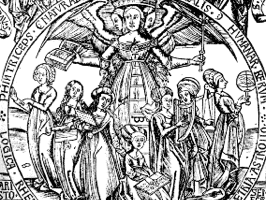In the Christian calendar today is the feast of Dionysius the Areopagite.
In the Acts of the Apostles, the second half of the text that we know as the Gospel According to Luke, there is someone named Dionysius who is converted by Paul’s sermon at the Areopagus, a famous rock outcropping at the Acropolis in Athens. According to Eusebius he would go on to become the first bishop of Athens.
Rather more important is that a series of writings appeared in the early 6th century attributed to Dionysius. Modern scholarship has noted the awkward gap of approximately five hundred years between the bishop and the author, and so usually the author is called Pseudo-Dionysius the Areopagite. This Dionysius would have enormous influence on the shaping of Christian mystical theology.
For me his approach to a negative or apophatic theology brings him into the large family of spiritual writers that includes many Buddhists. As the Wikipedia article on the negative way tells us “In brief, negative theology is an attempt to clarify religious experience and language about the Divine through discernment, gaining knowledge of what God is not (apophasis), rather than by describing what God is.” If you substitute “the real” or “what is” or even “sunyata” for the word God, it is possible to find compelling similarities.
And, of course, there are substantial differences. The Pseudo-Dionysius draws heavily on the Neo-Platonic traditions which have little direct commonality with Buddhism. But, still. We find the Japanese Buddhist scholar Hajime Nakamura describes similarities between the teachings of Dionysius and Nagarjuna’s Madhyamika Buddhism, seeing the Pseudo-Dionysius’ “super-essential Darkness” as roughly equivalent to Nagarjuna’s “void.” Nakumara goes even farther and suggests some passages in Dionysius’ Mystical Theology “might well be called a Christian version of the Heart Sutra.
One of my mentors the Buddhist philosopher Masao Abe was also aware of the deep similarities, as well as the differences between the mystical philosophy of Dionysius and Buddhism, and his own particular focus, Zen Buddhism. Citing this passage from the Mystical Theology:
Ascending higher, we say…
not definable,
not nameable,
not knowable,
not dark, not light,
not untrue, not true,
not affirmable, not deniable,
for
while we affirm or deny of those orders of beings
that are akin to Him
we neither affirm nor deny Him
that is beyond
all affirmation as unique universal Cause and
all negation as simple preeminent Cause,
free of all and
to all transcendent.
As Professor Abe says, “this is strikingly similar to Zen’s expressions of the Buddha-nature or mind.”
For me, as one who walks the razor’s edge between East and West, Buddhism as carrying my core theology and Christianity as the body of my childhood and early spiritual formation, this is all so wonderful.
And, so, I’m glad for the festival.













